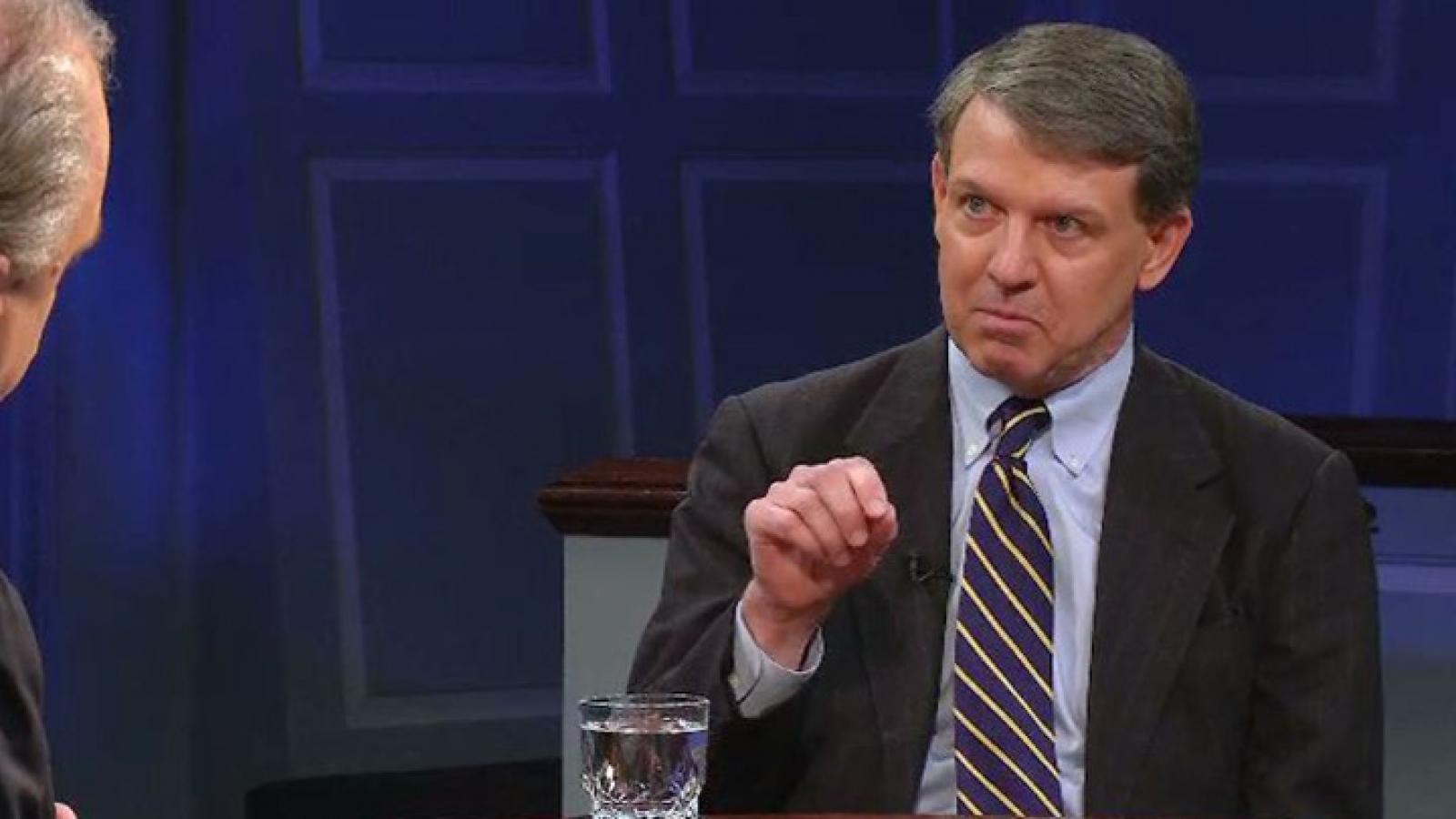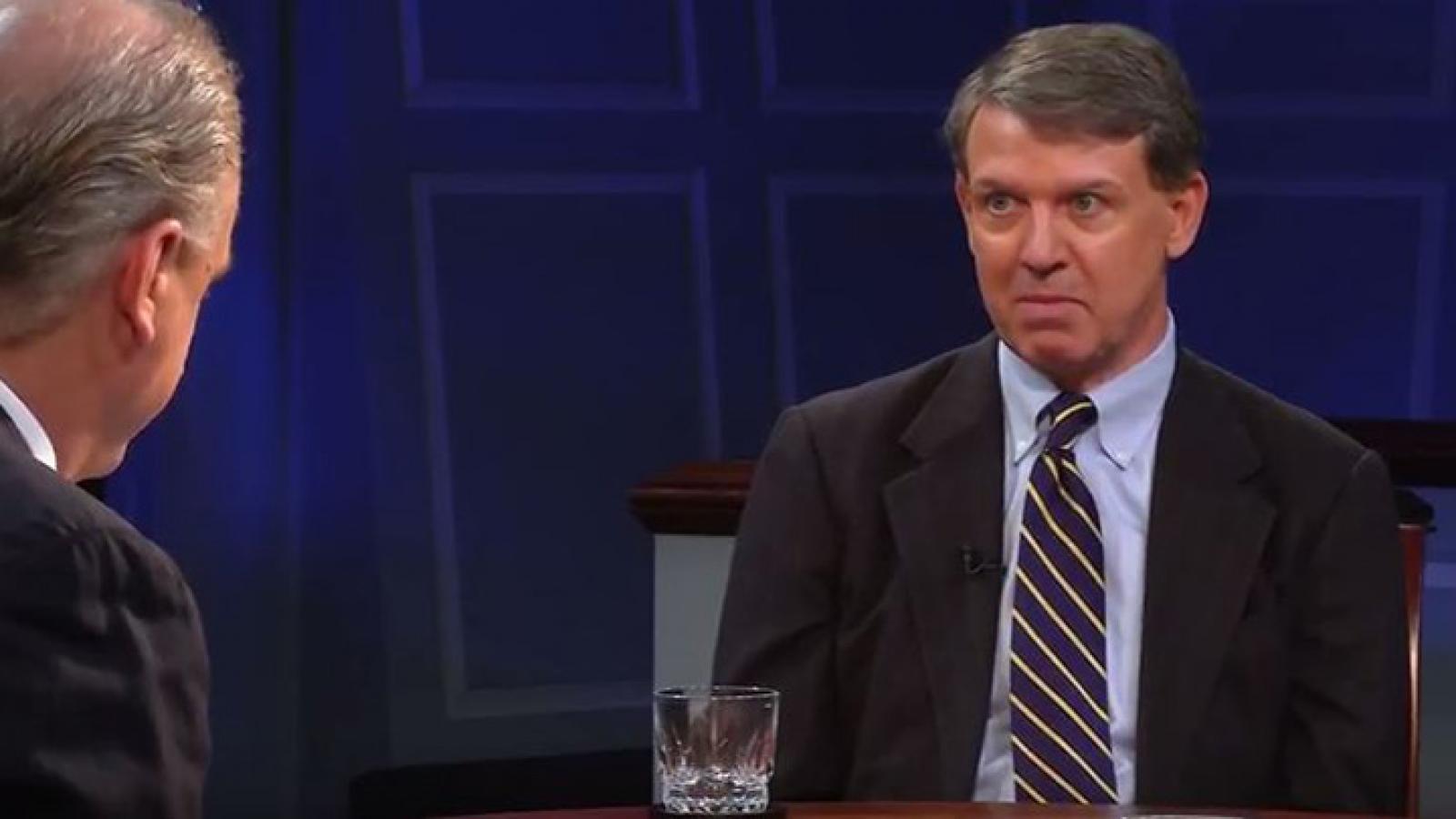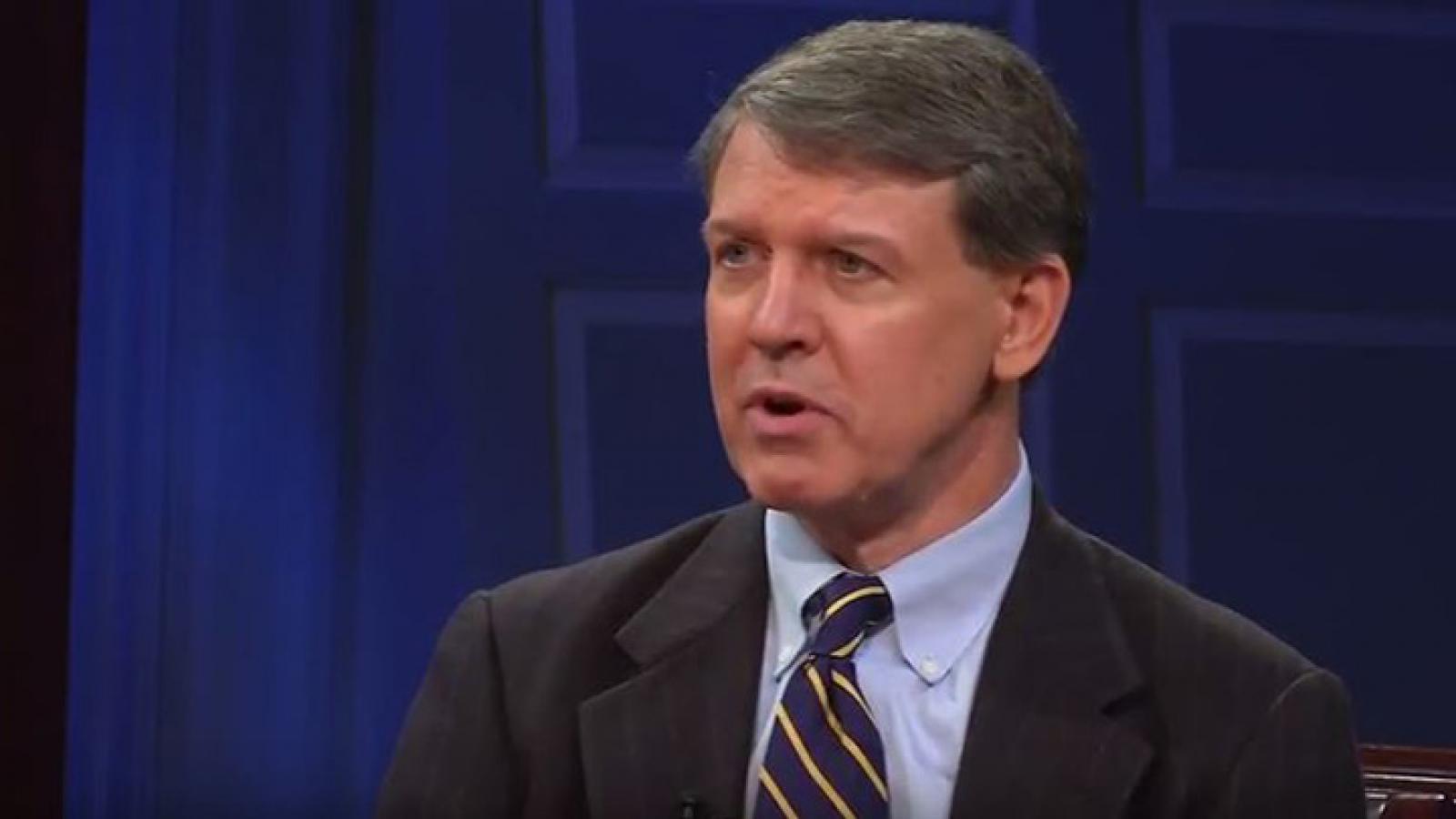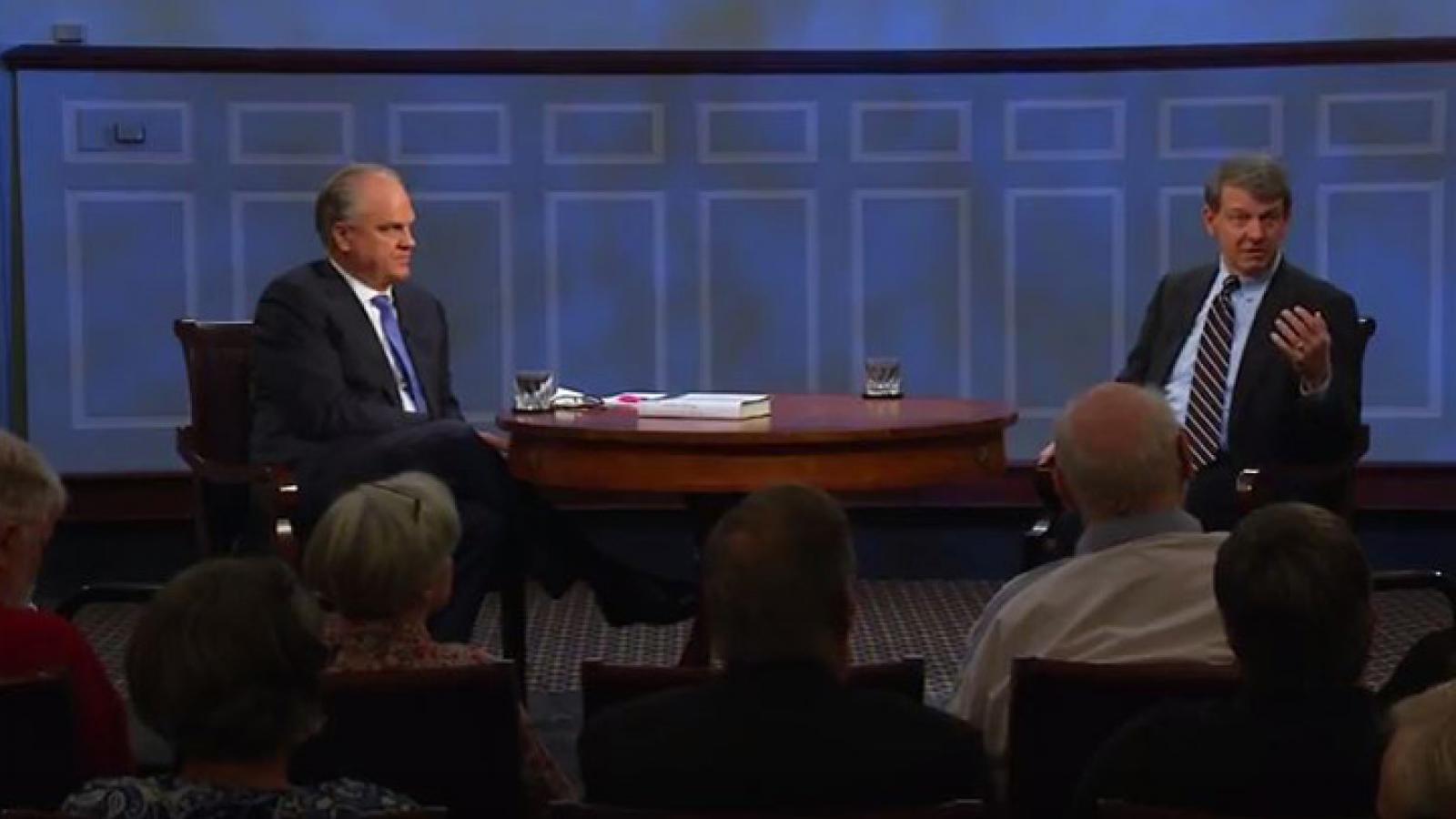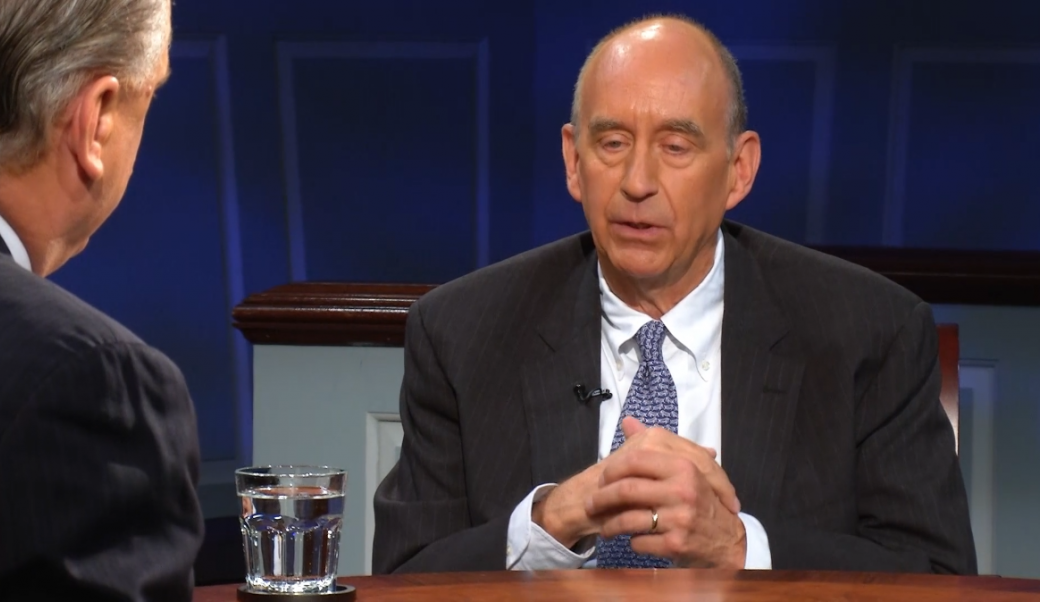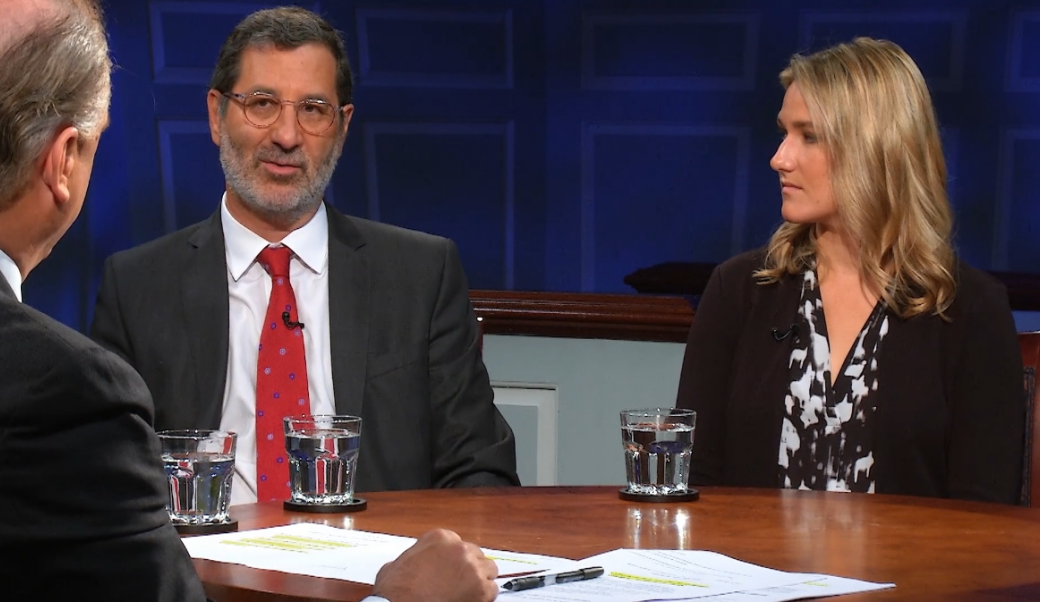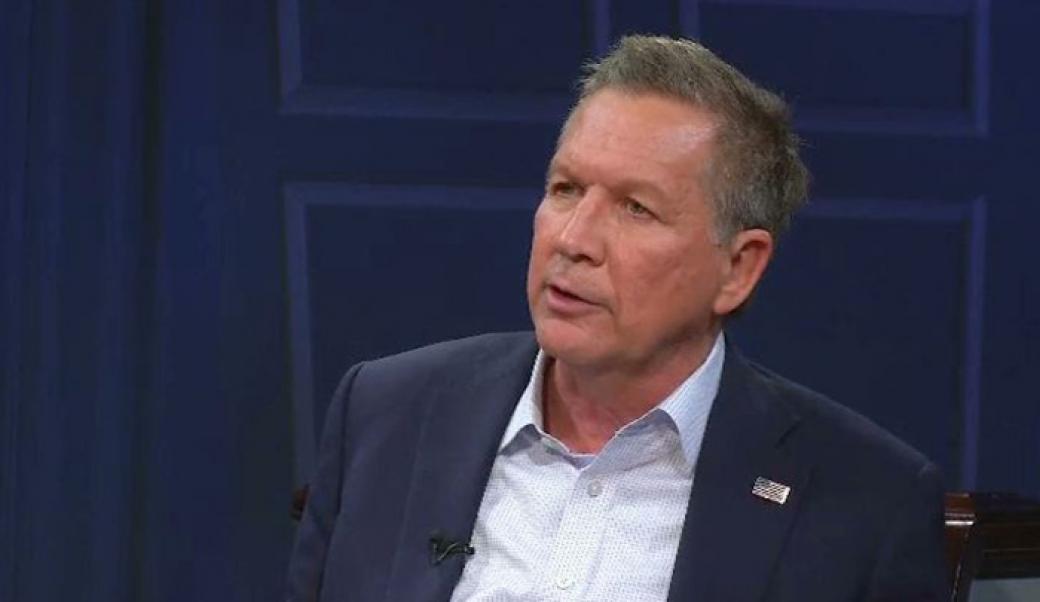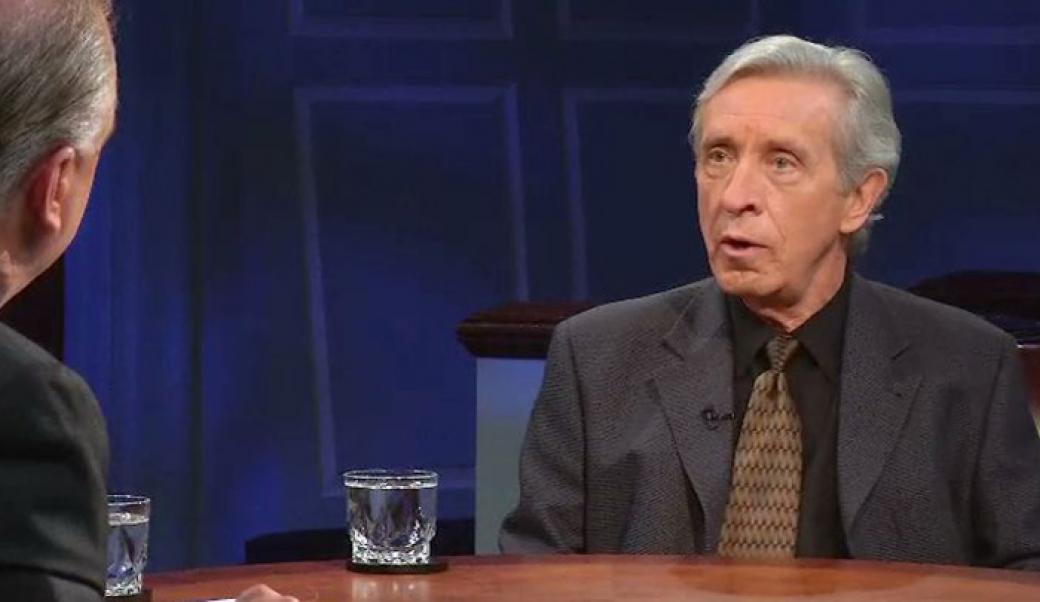About this episode
October 07, 2016
Russell Riley
How a presidential candidate would actually behave in the White House is always a source of speculation during a campaign. In 2016, voters are faced with an unprecedented scenario: a candidate who has already lived in the White House as a major political figure. We're joined by Russell Riley, cochair of the Presidential Oral History Program at the Miller Center and the author of a new book, "Inside the Clinton White House," drawn from more than 130 interviews with members of Bill Clinton's administration to explore what he has learned about Hillary Clinton.
The Presidency
What can Bill tell us about Hillary?
Transcript
0:52 Douglas Blackmon: Welcome back to American Forum. I’m Doug Blackmon. How a presidential candidate would actually behave once in the White House is always a source of mystery and endless speculation during a campaign. Especially during this one. But in 2016, voters also are faced with an unprecedented scenario of a candidate who has already lived in and operated from the White House as a major American political figure for a full eight years—that being former first lady and Secretary of State Hillary Clinton. She already has a long record from her time near the top of the previous Clinton presidency. She shepherded the ill-fated Clinton era effort to establish a national health care plan. And by almost all accounts, she was as deeply involved in presidential decision-making as any first lady since Eleanor Roosevelt. What does the record of that tenure tell us about her nature, instincts and skills, and how she might govern as president of the United States?
FACTOID: The Question: What does Clinton presidency tell us about Hillary?
Joining us to discuss that is Russell Riley, co-chair of the presidential oral history program here at the Miller Center. He has logged more than 1,000 hours of in-depth interviews with cabinet officers and senior members of every White House team reaching back to the Ronald Reagan administration, and is the author or editor of multiple books on the American presidency. Oxford University Press has just published: Inside the Clinton White House: An Oral History, drawn from more than 130 interviews directed by our guest, with members of the administration of former President Bill Clinton. Thank you for being here.
FACTOID: See millercenter.org/oralhistory for White House interview archive
Riley: Glad to be here. Thanks for the opportunity, Doug.
2:27 Blackmon: So, so let me get this right. Your job is just to interview people who have served in the White House, and been advisors to presidents of the United States?
Riley: That’s correct. I have one of the world’s great jobs. When it’s, when an interview’s going well you think there’s no place in the world you’d rather be. You have a front row seat to history, with people who have served in the White House, uh, in various capacities, and we have the great privilege of going in and talking with them in a candid setting, off-the-record, uh, and we record their observations and experiences to create a um, a spoken record of their, of their memories that will stand the test of time as we, uh, move into the future and want to know these presidencies better.
Blackmon: And for the Clinton presidency, one of several of these oral history projects that you’ve done with different administrations, uh, there were 134 interviews, correct?
Riley: Correct.
Blackmon: Did you participate in all those interviews?
Riley: Uh, almost all of them. I would say probably about a 110 or so. Uh, it’s important to understand that although I am seated here as the, as the co-chair of the program, that, uh, this was very much a group effort. We relied on I think 58 scholars from 37 institutions to help us, most of these interviews are group interviews. And my responsibility generally is to chair those interview sessions, and to, um, to recruit scholars from other institutions to come and help us. So, if we’re interviewing a national security advisor for example, we want to make sure that we’ve got at the table expertise in national security affairs so that we can really dig in and get, uh, and get at the bottom of, uh, what the person was doing in their time at the White House.
4:11 Blackmon: And so, in terms of the, these 134 interviews, we’re going to focus, uh, on how Hillary Clinton appears in the interviews and perceptions of her. But, one, did you interview either of the Clintons, President Clinton or First Lady?
Riley: No, no we didn’t, although it’s possible that an interview with President Clinton may still happen. It was a, it was a commitment to make that happen, we were working with the Clinton Foundation and the conduct of these interviews. And, uh, the problem that we’ve encountered, as you might imagine, with a presidential campaign emerging is that he’s been very busy, and we’re still hopeful that that will happen. Uh, Mrs. Clinton was, uh, active in public service during the entire time that we were doing this, first as a United States senator, then as, uh, secretary of state, then as a presidential candidate. And so, she’s been occupied doing other things during the course of the interview project. But we did interview a lot of people, obviously, who are very close to her.
FACTOID: Hillary Clinton served as Obama’s secretary of state from 2009-2013
5:10 Blackmon: Was there, um, you know, was the interview with the, one of the, you know very substantive players closest to the president, uh, where in the course of the interview you realized that, okay this is actually, either I came to this with a misimpression of this important sequence of events, or this is a revelation that I don’t think anybody’s heard before. Was there a moment like that?
Riley: Almost every page of the transcripts, and certainly every page of the book that I produced, has some kind of historical revelation and has something that most of us have no memory of or no recollection of, and no knowledge about. But it’s very much pointillist history, there, there are specific points that we don’t have registered any place else, and the great advantage of that kind of history is that you compile all of them together, and you get a uh, uh a body of information about this presidency that you couldn’t get anyplace else. And I liken it in modern terms to um, to the first time you go from watching one of the old definition televisions to watching hi-def TV. That everything is more vibrant and vigorous as a result of those individual points of history.
FACTOID: The Miller Center has done oral histories of Carter through Bush 43 Now there are some instances that, uh, that I think you do get some major revelations out of the archives. There’s three of them that come to mind. Bill Clinton is largely presumed to be a president who was poll-driven.
FACTOID: Bill Clinton won 1992 election with only 42 percent of the popular vote
I mean there is the, the um, the notion that they polled at one point a uh, a vacation site when Dick Morris had come back into the White House. One of the things that becomes clear in the course of, uh, the interviews is that that’s not entirely an accurate assessment of this president. There are multiple instances where he took positions that were very much not poll-driven. Uh, I remember talking to Bill Galston who was the deputy domestic policy advisor who said there’s no way that anybody would poll themselves into the kinds of decisions that Bill Clinton made on the economy in 1993, higher taxes, uh, fiscal stringency and so forth, uh, in producing that economic package. Nor would a Democrat in 1993 have embraced the North American Free Trade Agreement, which he had to work vigorous against his own party’s interests in order to have adopted.
FACTOID: NAFTA deal ceated world’s largest free trade zone
Those were positions he took because they were consistent with his principled understanding about what he ought to be doing as president. The same thing was true, uh, in foreign policy where shortly after the 1994 elections, he got his clock cleaned by the Republicans going into that election, his economic advisors come to him and say, Mexico is about to go in the toilet, that the peso is in a perilous condition, we have to do something. They called the new congressional leadership in, the congressional leadership says we will support you, let us go back to the Hill, uh, and sell a rescue package to the Hill. They came back to him a week later and said, we can’t get any traction on this. Clinton took unilateral action at a point when his national security advisor said this could end up costing you 30 or 40 billion dollars, that’s a lot of housing in Detroit that you’re not going to get to build if it goes south, because he believed, uh, in the principal of, of doing something to save somebody in the American neighborhood, he took that action against what the pollsters would’ve recommended. One other thing that I think, um, was kind of a revelation, uh, that resonates very much in the current environment is that both of his White House Counsels, uh, that we interviewed, uh, Bernard Nussbaum, and um Abner Mikva said Bill Clinton had many fine qualities as a president in terms of his use of presidential power, he had almost no concern with the form of the federal judiciary. That, he would not contemplate using up many of his presidential chips on judicial nominations. And it drove them a little bit crazy and it’s because one of the jobs of a White House counsel is to provide support for the president in his judicial nominations.
FACTOID: President Bill Clinton nominated justices Ginsberg and Breyer
But, um, this was a president for whom, for whom court appointments really didn’t register that highly in terms of his priorities. So I thought that was kind of a striking observation. It’s possible my colleagues who work in judicial politics are already on to this, but it was certainly new to me and it provides good inside information for people who know about it. Uh, that this was not something that Bill Clinton considered to be terribly important.
9:39 Blackmon: And so, in the general narrative of, of the Clinton administration, we know that the big, fat chapter that relates to Hillary Clinton is her involvement, very early on, with the healthcare reform effort, that ultimately fails. Uh, the other big chapter that she, we know she’s a character in relates to the Monica Lewinsky scandal and sort of the domestic and family issues that that raised.
FACTOID: Bill Clinton was first sitting president to testify before grand jury
We know less about the, we know some, there’s some hints at it in here, about the interaction between the, between the Clintons around that. Uh, but in a, in a, beyond those two episodes, are there, we also know that Hillary Clinton was obviously an influential advisor to President Clinton and involved in decision making, but less obviously in the latter half of the administration than in the first part. But what are the other big episodes, if there are, I mean, is that essentially, have I mapped out the basics of the Hillary Clinton story from the first Clinton administration?
Riley: No I think you have. Um, I think there was a sense after the failure of the health care reform effort that she had to take herself off the frontlines of policy making. I mean look, nobody was more scorched by that experience than Hillary Clinton was. We all look back and have recollections about the nature of that failure, but, you know, my goodness she was the person that was living it, and it was a very public and very prominent failure, and there was, um, you know, this almost instantaneous rebuke after it was withdrawn of the Republican revolution, uh, in which both houses of Congress went, the House of Representatives, uh, was lost to the Republicans by the Democrats for the first time since the early 1950s. So, you’d have to be pretty dense not to recognize that the, you know, the political system was recoiling against those particular efforts. And I think the Clintons took that very personally, both of them did. The president, I think, based on the evidence, may have recovered more quickly than she did. There was a sense that she’d no longer had the, um, she no longer had the ability to have the kind of role that they might have expected, had that succeeded, and so she, I wouldn’t say she faded into the woodwork, but she certainly removed herself with the president’s support from being on the frontlines of things, and became far more interested in a secondary set of policy issues, that umm also had importance I think, it’s this famous speech she made in Beijing that women’s rights are human rights, she became, uh, I think a, a more um, in some ways a more public advocate for women’s rights than before. She became interested in something called microcredit, uh, going abroad to help women abroad, uh, mainly by providing support for them economically. She did an awful lot of traveling; I mean in Sandy Berger’s interview. Sandy was the national security advisor.
FACTOID: Sandy Berger served as Clinton U.S. national security advisor
He said, you know she actually the ability to go, to go and do the kinds of things that Bill Clinton would have loved to have done. She could travel with a smaller package of people, she had maybe three or four aids and a small security detail. So if she went to India, for example, she could get off the beaten path and go off into the countryside and meet with people which was the kind of thing Bill Clinton would have loved to have done. But of course when he’s traveling you’ve got three or four hundred people involved, a couple of jets, and the security packages, so that there’s no way that, um, that he could have met with the common people in the way that she did.
13:10 Blackmon: She’s this brilliantly intelligent individual with a remarkable set of experiences, very firm opinions from the early point in her adult life about many many issues, and very committed to those very passionate about those.
FACTOID: As of late September 2016, Hillary Clinton had 41percent favorable rating
There is this question about how well does she collaborate. But she is not an inflexible person as evidence of the fact that you brought up Arkansas a minute ago. Well one of the things that happened between that electoral defeat for Bill Clinton and his return to office is that she changed her name. She stopped being Hillary Rodham and became Hillary Clinton because that was an issue in Arkansas of 1978-1980 and she came to look a lot different than the Hillary that I was around on any number of occasions back in those days. So that’s a small thing maybe a superficial thing but her adaptive ability is not insignificant, but the question is how would all that work now?
Riley: Well I, one additional observation on this was that again Bernard Nussbaum commented on how well she did as a United States Senate candidate in upstate New York.
FACTOID: Hillary Clinton won 2000 New York Senate race with 55 percent of the vote
This is because she’s not this sort of wild eye leftist radical that people expected her to be based on the accounts coming from the White House. But this was fundamentally a sort of Midwestern matronly figure who was able to go up into upstate New York and some very conservative places and develop a great deal of support up there. So you know I do think that there is some adaptability. You know quite beyond the tale that I told about Bill Clinton, you know, on the campaign. I think it’s not just you’re not stupid enough to repeat your mistakes but in fact you’re smart enough political figure in your own right to learn from those mistakes. I mean it’s striking. This is the, Mrs. Clinton first comes into the public eye 24 years ago, right? Which by my accounting is the longest any presidential nominee has ever been in the public eye, and in approaching a presidential election. Arguably Ronald Reagan, if you go back to the time when he was an actor and his time working with the union, but if you trace Reagan national debut to the early 1960s when he was speaking at the conventions, it’s a shorter period of time. That’s a 24-year public career is a terrible burden in a political culture that rewards freshness and change, and I think it’s uh, for all of the advantages that she has as an experienced politician coming in that it’s a disadvantage to her in facing the electorate because she has a lot more to answer for than virtually anybody who has ever run for president.
Blackmon: There is also an interview in which a top advisor and it might have been Kantor, discussing that view that in terms of the haters, the Hillary haters quote on quote, that that was primarily men, his observation was that it was primarily men, and that women gave her, oh no I’m saying it backwards, I’m sorry, that it was primarily women who were Hillary haters because of their reaction to, this is from someone else, she appeared something of a, no this is the quote, “she appeared to be something of an a front to a sense of who they were as women; more women despise Hillary Clinton than men ironically because to them she appears to be a commentary on the life they’ve chosen. That was Roy Neel, chief of staff. But that jumped out at me because of, I think that certainly no, among Hillary haters now, one would I think would say that appears to be more of a male phenomenon, though there is a thread of this female issue, but yeah does that sound, were there other echoes of that observation?
Riley: Well I, almost every interview we got, the question was how do we explain the extraordinary level of vitriol that was evident about the Clintons that was as his time as governor that I think was really in many ways unique in the American experience. And I don’t know that we ever firmly got an answer to that question, one that I felt was dispositive of the matter. There is plenty of commentary in the book about that. We tried to get people on the record, what is it that accounts for this. It’s this odd stew of criticism of Bill Clinton from extreme right as well as the extreme left. There were people who were furious with him over the Lewinsky scandal because of what it meant for women.
Blackmon: And also more traditional things like reform, there’s still many criticism among democrats on the left.
Riley: That is welfare reform, is a terrific example of this. When we asked Leon Panetta about the roster of accomplishments that Clinton had succeeded in bringing to fruition, he goes through an array of things but doesn’t mention welfare reform because he was against it. And Rodger Altman again the deputy treasury secretary said, you know, if you were to interview the top 50 people of the Clinton administration, 25 of them would tell you that welfare reform was the greatest thing Bill Clinton ever did and 25 of them would tell you that it was the worst thing Bill Clinton ever did. It was an issue that really created fissures within the Clinton networks. And by doing that I think it’s sort of testament to the difficult political environment that he was serving in. And it also is part and parcel of why there are still controversies arising both over the presidency as well as the person who’s emerging now and running as a candidate in her own right.
19:35 Blackmon: Hillary Clinton also was clearly very affected by the harsh nature of these debates around healthcare reform.
Riley: Sure.
Blackmon: Around welfare reform, now the crime bill, which was not as a controversial issue at the time, and now is resurrected as one. Even the free trade agreements that President Clinton pursued so vigorously that now candidate Clinton would appear to specifically oppose to some and would appear to have reframed in general. But so clearly she is someone who walked away with scars from those things; walked away with big scars from the Lewinsky scandal. But also I think if you roll back in time further and you look at this young woman from Wellesley, from Chicago, who ends up marrying this slightly countrified guy down in Arkansas, and goes down, and one of the observations I’ve always made about Arkansas is that it doesn’t have a governor it has a mayor. And if you live anywhere in Arkansas the governor is your mayor. So that was the case in the ’70s and the ’80s.
FACTOID: Hillary Clinton was raised in Park Ridge, Illinois, just outside Chicago
FACTOID: Clintons married in Arkansas in 1975, Hillary kept maiden name until 1980
And so she ends up in this place that is suspicious of her, suspicious of her last name. So you’ve got somebody, who has a long public life, that you just described, but that has been shadowed by and there has been no honeymoon at any point arguably for her. Bill Clinton had a honeymoon, but I’m not sure Hillary Clinton ever had a honeymoon. I think—
Riley: Bill Clinton didn’t have much of one I can tell you that. He didn’t really have much of one. If you go back to gays in the military and controversies over attorney general appointments and so forth boy that was just, it might have been a couple of weeks but he didn’t have much of one either but—
21:11 Blackmon: Oh no, if he had a honeymoon it was when he was the youngest governor in American and then [Riley: Yeah.] is he going to run in 1988, but the, but for Hillary ultimately it makes the foolishness of the email scandal for instance which is in current time not part of her interviews, but the clear foolishness the admitted foolishness of that whole thing makes more sense in my mind in the context of this long career in public life that has been so examined and at least in her opinion so often mischaracterized. [Riley: Sure.] Does that make sense?
Riley: I think look, she took heat at one point about making claims about a vast right wing conspiracy. I think any objective analysis, I don’t know how vast it is, but certainly there have been organized efforts to undermine the Clintons politically going way back to Arkansas. And some of it just terribly unseemly. And she is still dealing with some of that. I think the point that you’re making with the email scandal is probably well taken. There is one might argue a kind of natural inclination if you have taken the, if you’ve been beaten up as much as she has over decades now that one might be perhaps a little more over sensitive to things than one might of argued from the outside that she should be. Look, as a political historian, and as somebody who is the business of recording oral histories, I yield to no one in my commitment to open records and my great dismay over the email situation was not that she was trying to hide anything in particular, but that it clearly is an instance where when it succeeded, it deprived us of the kind of historical records we would need in order to make a full and accurate assessment of what she was doing. And it’s very hard to believe that after eight years in the White House, where this was very much an issue, that that couldn’t have been on somebody’s mind somewhere.
23:30 Blackmon: So it gets us back to this basal question, is it about personal ambition, making history, is that actually what fuels her through all of these difficulties that she has had? Or is it about that she, a sense of her own real brilliance and destiny and a capacity that she believes that is actually there to change the course of the country? In the end what’s your [Riley: Oh, gosh.] what would you say?
Riley: Nobody can rise to the presidency in the United States without the extraordinary sense of ambition. I don’t know whether we expect them not to. That it’s the marriage of that personal ambition to policy outcomes that actually makes the political system work here. And, so it, it can be a little bit unseemly particularly if somebody wants to use that ambition too thoroughly for their own personal gain. Or it’s just very natural for to look at somebody on the other end of the political spectrum and to question their ambition because they’re pursuing goals that I don’t believe in. But I think any objective analysis would have to say it’s got to be a little bit of both. And it ought to be a little bit of both and we ought to be happy that it’s a little bit of both. That, umm, that which makes people a little bit defensive in, in too much measure is what makes them precisely effective in a political system where, as Madison said, “ambition has to counteract ambition.
24:59 Blackmon: Well thank you for the book. Thank you for the years of work that went into this and all the other presidencies.
Riley: Sure. Thank you Doug.
Blackmon: The book is: Inside the Clinton White House: An Oral History. If you’d like to send us a comment about this episode or join an ongoing conversation about the presidential campaign, go to the Miller Center Facebook page, or follow us on Twitter. My handle is @douglasblackmon. To watch other episodes of American Forum, share them with your friends, join our email list, or read a transcript of this dialogue, visit us at millercenter.org/americanforum. I’m Doug Blackmon. See again you next week.
